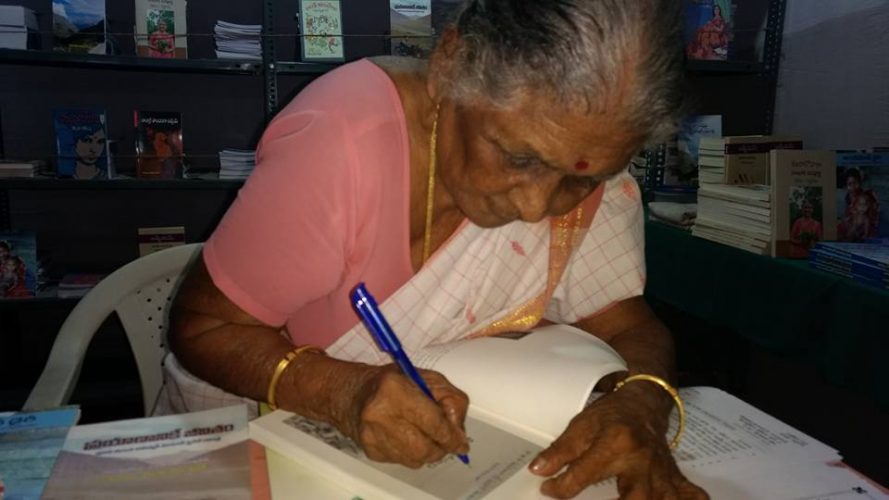Original Title in Telugu: తిరిగి ప్రవాసానికి/tirigi pravaasaaniki
Author: నంబూరి పరిపూర్ణ/Namburi Paripurna/ Translation: V.B Sowmya
Namburi Paripurna (b. 1931) is a well-known Telugu writer and social activist. She has been writing short stories and essays for over 50 years. Her autobiography “velugu daarulalo” was published in 2017.
The original Telugu short story first appeared in “Vanitha”, a Telugu fortnightly, in July 1993. It can be accessed on Katha Nilayam website here. Although the story was written almost 30 years ago, the issue it touches upon is contemporary even today. The urge to go back after returning to one’s home town/state/country is not unusual and we actually see/hear such stories in our daily life. However, it isn’t reflected in the fiction I usually read. This is the reason I chose this story to translate.
*
“Finally, we are back among our people. Hyderabad’s climate and lifestyle cannot be compared with any other city. Our children would now study in Telugu schools and learn to speak good Telugu! We can visit our hometown every weekend and look after our farmlands.” Prasuna said to her husband. One could sense her happiness in her gleeful eyes and rosy cheeks.
“Of course, why do you think I tried so hard for this transfer? Did you see the excitement with which my sister arrived from Bhuvanagiri as soon as she heard the news of our arrival? By the way, how is the house? Do you like it?” – Hareendra asked, visibly happy to be back in the Telugu land.
“Yes, this house appears grand. Our town’s MLA built it with all the amenities. Since we all hail from the same place, he rented it out for just 1500 rupees. He would have asked at least 2000 rupees for anyone else. “
“We have both been classmates since childhood. He still remembers that association. Anyway, I guess both of you sisters-in-law will now get started with unpacking. If you can make me a cup of coffee before that, I shall take care of my breakfast at the office canteen.”
“Sorry! We have not performed the ceremonial boiling of the milk yet. Your sister is just getting ready for that. As you know, we cannot prepare anything on the stove until it is done.”
“Okay, carry on! The coffee served in the canteen is bad. I will adjust with tea today” – Hareendra waved a bye to his children and left for the office in his Maruti car.
The families of Hareendra and Prasuna left the shores of Krishna river and moved to the Telangana region about 30 years ago. Hareendra’s parents bought 50 acres of barren land at 50 rupees per acre and settled in a village near Medak. Prasuna’s parents bought 30 acres of irrigation land at Rs 100 per acre near Nizamabad and started living there.
Hareendra’s father Raghavayya was a smart and hardworking farmer. He looked around for a good underground water source in his land and dug a borewell there. This ensured water supply to his crops. He followed the guidance from the irrigation department and kept track of modern farming practices. Within two years, the barren land became a fertile and green farm.
Hareendra found a job in New Delhi soon after his marriage to Prasuna a decade ago. He works in the purchase section in one of the Central Government’s Defense projects involving an international collaboration. Their company set up a branch in Hyderabad five or six years ago. After his father’s death two years ago, Hareendra noticed that their crops suffered due to poor handling by the leasers of their farms. So, he started lobbying for a transfer to Hyderabad. Finally, it all worked out.
It took a week to unpack and organize the house, and clean the yard. The front yard had several flowering plants, and the sides of the house as well as the backyard had trees and plants bearing fruits and vegetables. Prasuna was impressed with her well organized home and its surroundings.
Although it has been a week since the move, they did not get to know any neighbors. What surprised Prasuna is the fact that none of them visited them either. One evening, she visited a few neighboring homes and introduced herself. She also gifted a pack of Peta, a famous Agra sweet, to the children in these homes. She shared about her husband’s profession, that they moved to Hyderabad to be closer to their hometowns. She invited everyone to her home, with a friendly and open heart.
Summer holidays ended, and schools reopened. Prasuna’s two children got admissions and started going to a school. It is close to two months since their move now. Yet, the children did not find friends easily in that neighborhood. Since no adults visited their home yet, kids who usually accompany them did not come either. So, the two children have been playing between themselves, with sad faces.
It is a small colony with sixty families. About ten of them are Hareendra’s colleagues. The rest relocated to the capital city at the time of Andhra Pradesh state formation. Although they are not highly educated or qualified, they all could find jobs in government and private organizations and establish themselves there. Several of them set up their own companies and small businesses along with their jobs, bought houses and settled well in their lives.
We all wish for everyone to do well in their life, and live happily. But of what good is it if the men consider life as some kind of a race and that getting rest is a waste of time? Women became symbols of neo-richness. When they feel it is beneath them to talk to neighbors, one would wonder if man is indeed a social animal.
Prasuna started feeling restless in this atmosphere and wondered how she could make friends in this neighborhood. She went around meeting the women of the colony again and proposed to set up a women’s association. She listed all benefits of such an organization. They could all gather together every afternoon for an hour in the community hall to discuss new recipes and other household tips. They could also build a mini library with weekly magazines and expand their mental horizons. She proposed to hold the first meeting at her house on Sunday and invited everyone. They all agreed to come.
Sunday came, but no one arrived. After a long wait, three college going women showed up, and they all lamented together on the lack of enthusiasm for a women’s association in the colony.
The month of Karthika2 is usually cool and pleasant in Hyderabad. But Prasuna felt lonely, far away from a friendly community helping and supporting each other in daily life. In Delhi, where they lived before, they used to organize communal lunch outings and picnics during this season. Everyone in the colony irrespective of their age used to participate joyfully and merrily.
Prasuna started visiting the neighboring homes again with some new ideas. “Let us all go for a picnic. We shall cook one dish each, go to Indira Park or Sanjeevayya Park, spend the day there and have fun together” she suggested.
“We women don’t socialize alone without the men from our household”
“We are not on talking terms with that family. How can we go on a picnic together?”
“We haven’t eaten together with anyone else except our extended family. We cannot eat mailakoodu3 with others”
- Prasuna’s campaign went in vain as all sorts of objections showed up.
She started losing faith in herself, and it turned into self hate. She felt useless and inefficient. One day, as her head started aching, she lay down on her bed and closed her eyes. Memories of life in Delhi flashed by.
About fifty Telugu families belonging to both officers and workers cadre lived in the company quarters. Hierarchies in job profiles ended at the office. At home, everyone had the camaraderie of belonging to one state, and speaking one language and a Telugu pride was visible. If one heard someone speak in Telugu around Connaught place or Qutub Minar, it felt like sweet music to the ears. Being a fellow Telugu speaker is enough. Caste, religion, region or status of the other person did not matter. They would become friends within minutes, exchange addresses and extend invitations to visit each other’s homes.
Some of the well educated women among them who did not want to dedicate their lives to the kitchen did M. Ed or B. Ed and worked in schools. Because of the shift system, they returned home at 2 pm whereas their children were back by noon. These children just spent time with neighboring families of their choice, enjoying some snacks and hospitality till their mothers returned home. Working women weren’t too worried about the safety of their children there.
Prasuna remembered how much help they received during a tough situation in the past. She had to go through her second delivery at the company hospital instead of going to hometown. Some North Indian women did not go to their parents homes even for the first delivery. Company hospital was very clean. There is free healthcare, and the doctors and nurses took good care of you and are interested in your well being. Not everyone can get these in their hometown!
One day, in the middle of the night, her labor pains began. Hareendra hurried to open the garage and start the car, to take her to the hospital. Neighbors Lakshmi, Bharathi, and Swarna heard her cries and the sound of the car starting. They immediately accompanied Prasuna and Hareendra to the hospital. They just waited in the area opposite the maternity ward on that cold January night until she delivered a baby. The infant had jaundice and they couldn’t get discharged for another week and half. The neighboring families took care of all of her necessities during this period. They also provided for Hareendra and their son. Even after returning home, someone or the other kept sending them food for several weeks. Everyone in the colony got such neighborhood support in such situations.
Anyone who went to Andhra bought famous snacks from the region such as Kakinada Kaja4, jackfruits from Visakhapatnam, or crawfish based preparations from Bandar. The snacks were distributed to several families in the neighborhood. Prasuna also once got six kilos of jujube fruit from Hyderabad, and it was relished by many.
The colony had a club with all amenities, including a library. People of all age groups gathered there in the evenings. From newly married couples to other men, women, and children – everyone played table tennis, shuttle badminton and other recreation sports. It was a pleasure to watch all this activity in the community.
Every year, the Telugu families in the colony celebrated Ugadi, the Telugu new year, together. They also joined people from other states to celebrate club anniversary events. Men and women participated in all the sport and cultural events equally, without any inhibitions. When Punjabi brothers and sisters started Bhangra, everyone joined it with such enthusiasm that the dance never ended. Where is that joy and camaraderie in this colony here in Hyderabad?
Prasuna was watering plants one evening, when her son’s classmate came running towards her in a hurry. “Your son fell while getting off the bus” – he said. She ran to the bus stand immediately, leaving the water hose as is. Her son was lying there on the road, his face facing the ground. She tried lifting him up carefully, but he let out a loud scream. He was visibly in great pain. She managed to bring him home with help from an auto driver, and informed Hareendra, who came home immediately. They took the boy to Nizam Hospital’s Orthopedic unit. The boy’s left shoulder was fractured and two bones were dislocated. There was a joint injury near his arm too. His hand was covered with a sling and he was advised to get treated for another month there. Prasuna visited the hospital alone every day and sometimes stayed overnight. Hareendra dropped off their daughter at her grandparents’ town. She had to take time off from her school. It took almost two months for Prasuna’s son to fully recover. Immediate neighbors checked on them once in a while. Others in the colony did not even bother to say hello. No one offered any help. Prasuna felt they were living in a desert.
It is now ten months since Hareendra’s family moved to what they thought of as their home state. There were 20 days left for the next Ugadi. The couple were already tired and lost interest in any celebrations.
However, the college going women in the colony suddenly got interested in the event. They surrounded Prasuna and suggested celebrating Ugadi together like the out of state Telugus regularly do. They proposed to organize some games and competitions for everyone, with prizes for children. They added that their sisters and sisters in law in their homes were all in favor of this idea. Prasuna felt happy and wondered if all her efforts were finally bearing fruit.
They all started practicing in the community hall. Young ladies did running race trials. After a few days, the men of the colony started noticing. One day, about half a dozen men came and knocked on Hareendra’s door. “What is this, mister? It is insensible to bring our ladies out in the name of such events like running race. What do you think we are, to let our women folk run around freely like that? Your wife is up to no good. Looks like she has plenty of idle time. Keep her in check” – they vented out their anger, and went away as fast as they came.
In another four months, Hareendra and Prasuna managed to transfer back to New Delhi with superhuman efforts. All the Telugu families were happy to see the friendly and enterprising couple back. Swarna, Lakshmi, and Bharathi welcomed them affectionately and they spent a long time chatting about the happenings of the past year. They asked them to settle down and relax for the day, and offered to take care of their food needs.
This was followed by a constant flow of visitors for the next couple of days. Everyone came to express their happiness upon the return of Hareendra and Prasuna. “Finally, we returned to our people. I can’t express how much I missed this friendship and camaraderie!” Prasuna said, evidently relieved.
“You are absolutely right” – Hareendra agreed wholeheartedly!
Glossary:
- ceremonial boiling of the milk: It is a part of the Hindu traditional rituals when entering a new home in some parts of India. Milk is boiled in an open pot until it runs over. This symbolizes abundance.
- Month of karthika: a month in the Hindu calendar that typically overlaps with October or November in the English calendar.
- Mailakoodu: food considered impure by some, as it is not cooked at their home.
- Kakinada kaja: It is a sweet delicacy from the city of Kakinada in Andhra Pradesh, India. https://en.wikipedia.org/wiki/Kakinada_Kaaja









[…] ఆంగ్లంలోకి అనువాదం కూడా చేశాను (Returning Home, Little Srinu Thinks Big). ఇక తెలుగు/ఆంగ్ల వికీపీడియా […]